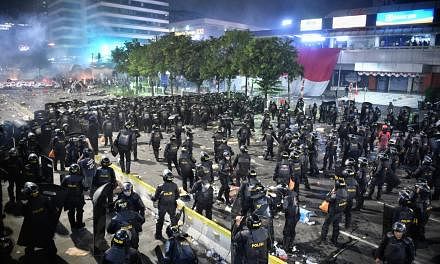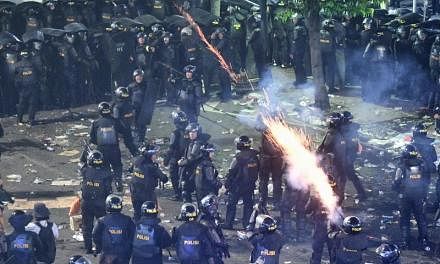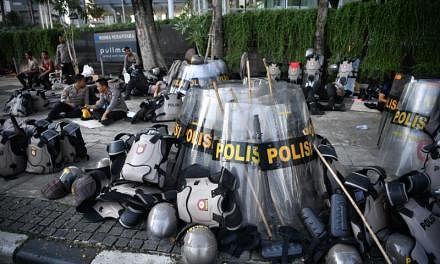JAKARTA - Indonesia is deploying more than 32,000 troops to secure its capital Jakarta, following intelligence of possible terrorist attacks during the release of the presidential election results in the week ahead.
Security agencies are scrambling to foil what they suspect is a plot by a local militant group to set off bombs during street protests, expected after the official vote count is announced by the elections commission (KPU).
"There are indications of terrorists possibly mounting attacks when there is a mass gathering at the KPU building," said national police spokesman Dedi Prasetyo on Monday (May 13).
"So we are taking precautionary measures to optimally thwart such acts."
Brigadier-General Dedi said police and military personnel will also set up security cordons around the Bawaslu elections supervisory body headquarters in downtown Jakarta.
The building is located in Jalan M. H. Thamrin, a major thoroughfare in the city where the first terrorist attack in Indonesia claimed by the Islamic State in Iraq and Syria (ISIS) played out back in 2016.
Last week, supporters of presidential hopeful Prabowo Subianto held two street rallies at Bawaslu to pressure the elections watchdog to act on his allegations of electoral fraud at the April 17 polls.
More such protests are expected in the days ahead, with Mr Prabowo showing no signs of conceding a second race to the incumbent Joko Widodo, who interim results indicate is set to be re-elected once the official vote count is completed by May 22.
The move to beef up security, particularly around the elections commission and Bawaslu buildings, comes after police last week busted a terror cell.
The group was armed with homemade bombs and had the ability to circumvent electronic safeguards set up to prevent bombs from being detonated remotely by a terrorist using a cellphone or radio transmitter.
These signal jammers are effective defensive devices used to protect large areas from a remotely operated improvised explosive device, or IED in military speak.
One of the suspects arrested during the raids by Indonesian counter-terrorism police last Wednesday had modified the switching mechanism of an IED so that a bomb can be set off using Wi-Fi technology instead.
This means the suspect could use Wi-Fi to detonate a bomb in the event that regular cellphone signals are jammed by the police during a protest, said Brig-Gen Dedi.
"With that, he can put (their bombs) in some backpacks, and later he would just detonate them from a distance of 1km for example," he said, referring to a terror suspect he identified only by the initials EY.
Brig-Gen Dedi did not disclose the total number of suspects arrested in last week's raid but he confirmed that a manhunt is ongoing for other members of the terror cell, which is linked to the Jemaah Ansharut Daulah (JAD).
The JAD, a local militant group with loose ties to ISIS, is responsible for a series of terror plots in Indonesia including the 2016 ISIS-inspired attack in Jakarta, as well as the coordinated suicide bombings of three churches and the local police station in Surabaya in May last year, which killed 14 people.
EY and a second suspect were arrested separately last Wednesday in East Jakarta and Bekasi respectively, based on information from a third terror suspect picked up by police earlier in the week.
Brig-Gen Dedi said that while the police remains the primary target of the JAD, a large crowd of protesters gathered outside the KPU, for example, would also make a soft target for the militants.
He added that the terrorists were hoping that their success in mounting a large-scale attack would reinvigorate other sleeper cells across the country.












